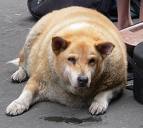
OK, let me state my bias here. I am fanatical about keeping my dogs’ weight down. I am probably known for having lean, even at times skinny dogs. But then I never have joint problems or injuries, even as my dogs fling themselves off mountaintops (well, scramble down steep paths anyway) or hurl themselves around an agility course. Why am I so maniacal? I love my dogs dearly, but I do not want to love them to death, which is what you do when you create a fat dog. I think you all know this, but extra pounds on your dog can create life-threatening new health problems or exacerbate existing ones. In my last two years of running the Doberman rescue scheme I have seen a lot of Doberman’s, and I am astounded at the number of Dobes which are overweight. It is actually HARD to make a Dobe fat! (By the way, these fat Dobes also belong to all sorts of people who love them very much). I have just been involved in a pet slimming scheme in which we brought a 7 year old Doberman bitch down 18kgs from 52 kgs to a good weight of 34 kgs. She had fatty deposits in her ears causing chronic ear infections, early onset arthritis, and could barely walk. When I walked her it was like walking a pet pig; I felt an unbearable need to explain to everyone that I was not the one who had done this to her. About a year ago I was called to the house of someone who wanted me to take a look at their five year old neutered male, who was being destructive and running havoc through the landscaping. When I got there, upon meeting the dog, I was struck dumb, to the point where the owner gently repeated his question to me and asked if I was all right. I said, “I’m sorry, but my mind is utterly blank except for the thought that I didn’t know a Doberman could get this fat! Maybe your problem is that this dog just needs some exercise and less food.” The owner then gave me the classic response: ” He’s put on weight since he was neutered. It makes them fat you know.” Here’s the health tip for the day: Neutering and/or spaying DOES NOT MAKE YOUR DOG FAT! You do, by not understanding that sterilizing does have an effect on their metabolism which means their food intake must be adjusted, sometimes dramatically, and exercise maintained. My own spayed bitch now eats half what I fed her when I first got her as a 15 month old unspayed bitch. The other classic response which then follows is “But he only eats this much.” And I have yet to see a fat dog who is not eating a lot of extras along with his kibble – the table scraps, four pieces of bread, the liver paste/tinned food put into his food to make it tastier etc. It is very hard to manage weight if you give all these extras, but the fact is, if your dog is fat, feed him a third less until he isn’t fat anymore. Try staring a shivering miniature dachshund in the face as you count the kibbles (mine eats 20 kibbles twice daily, unless it is fig season in the garden where it goes down to ten.) She inhales it in (literally) five seconds. But I never am even slightly tempted to let her put on weight, because I have sent the difference that even a 5% increase (150gs) in her weight makes on the mountain runs. Do not assume that what you read on the dog food bag is God’s truth. The older bitch above who lost 18 kgs runs on the beach for an hour a day eats the amount recommended for a 25 kg dog to keep her weight stable. My highly active slim Doberman’s eat 50% more than is recommended. Those of us who compete with our dogs adjust their food on a daily basis depending on their waistline look and level of exercise. What is fat? You should be able to comfortably feel the ribs (without digging your fingers in!), and perhaps (I think) even see them when the dog lays on its side. Recent veterinary research has shown that dogs which people would normally classify as underweight actually live longer and healthier lives. You should have a very clear waist which goes markedly in just behind the ribcage and in front of the hips. Have your dog weighed at the vet, and ask your vet to tell you truthfully how much they think your dog should weigh (make it clear you really want to know because some vets HATE to tell you your dog is fat in case they lose your business), and then work to get that weight. Be sure to let them know if you will be doing dog sports such as agility, as it will influence their recommendation. Know that if you are interested in doing agility that the agility trainers will not allow a dog who is overweight to jump the recommended height until the weight problem is resolved. This is for the long term health of the dog, as well as for the advancement of your agility career. Fat dogs just don’t run fast! Give your dog cow hooves or rawhide treats if you feel they need something special, but remember that feeding them enough to make them fat does not make them healthy or happy. Please do not love them to death.
This article is copyrighted and remains the property of the author. Individuals are welcome to print or copy same for their own use in furthering their knowledge of dogs. However, no reproductions or alterations/variations are allowed without the express written consent of the author.
